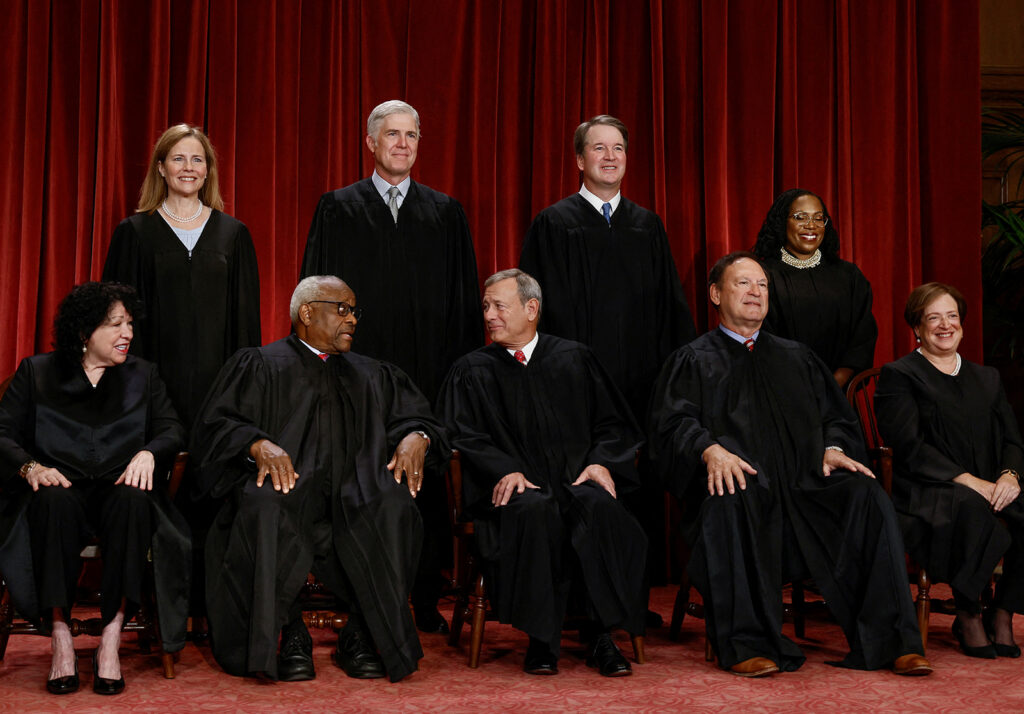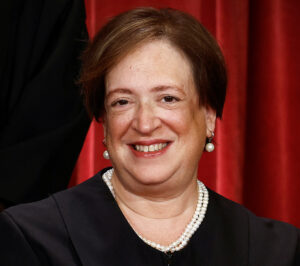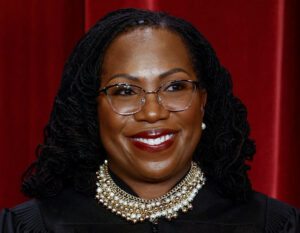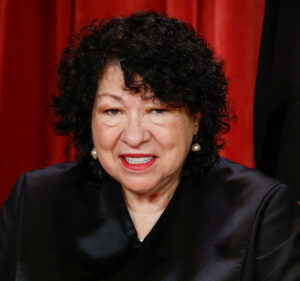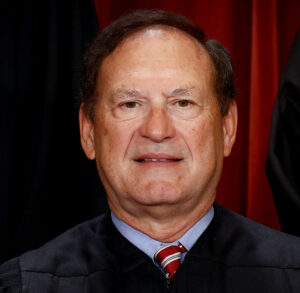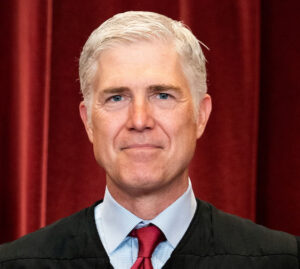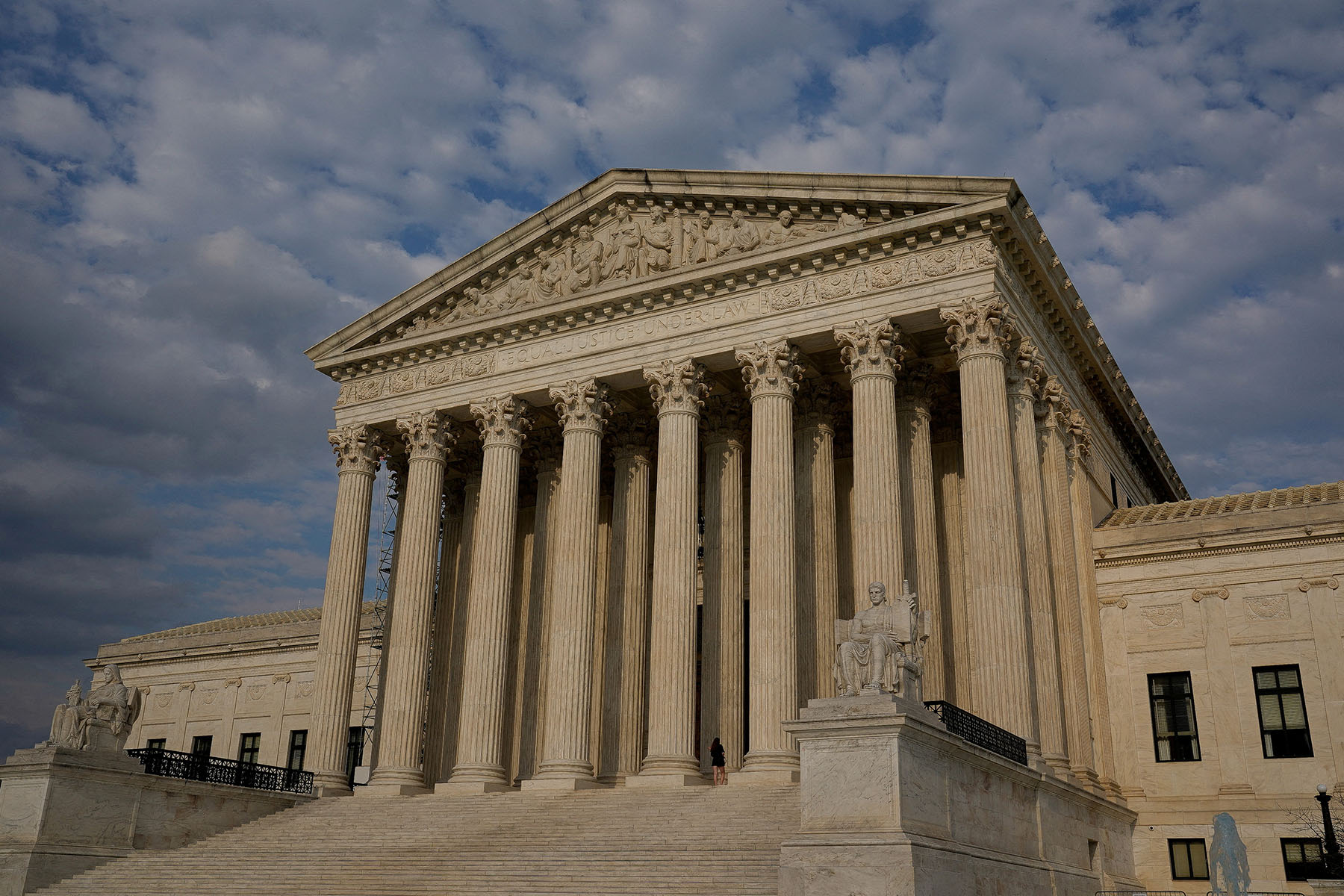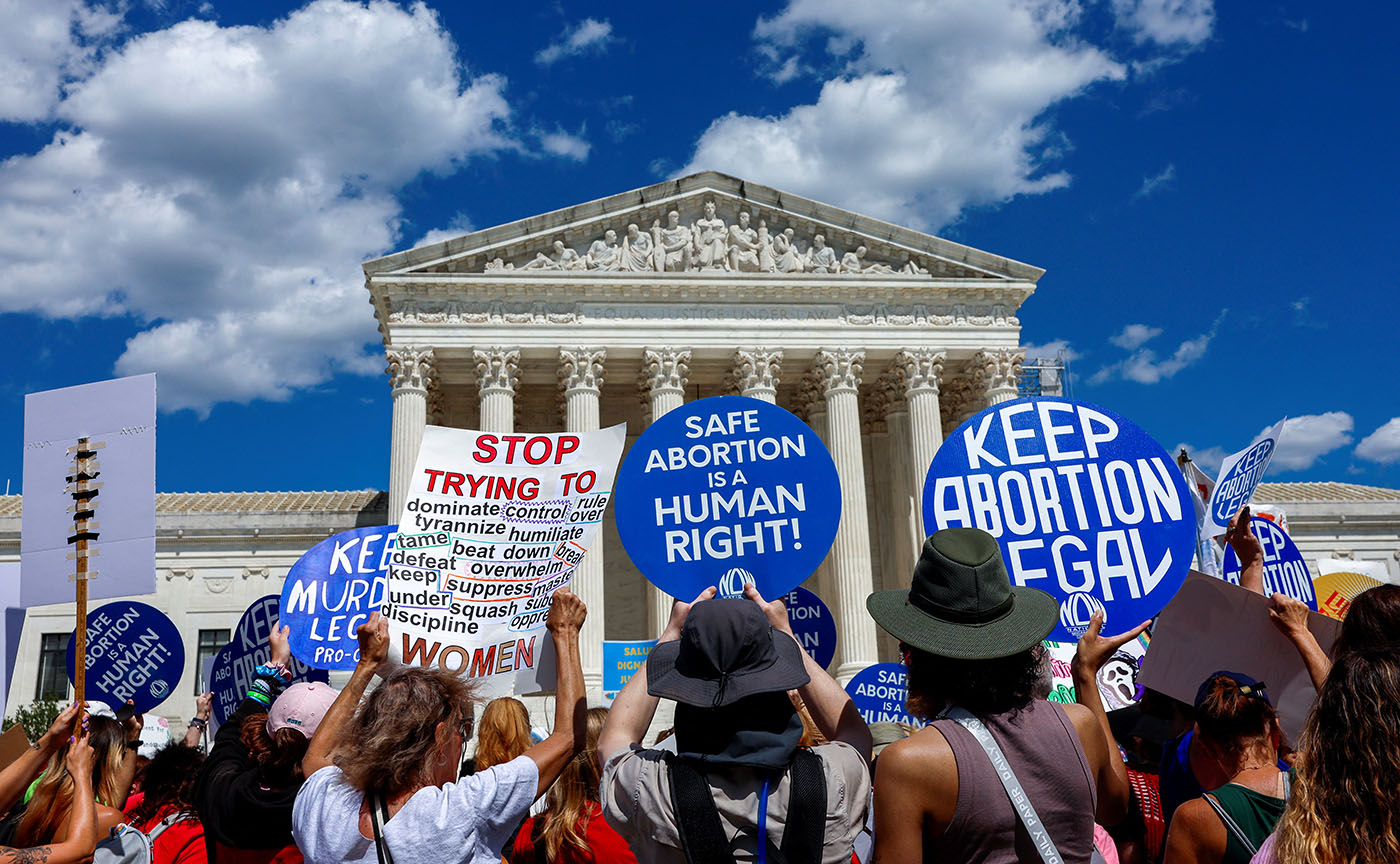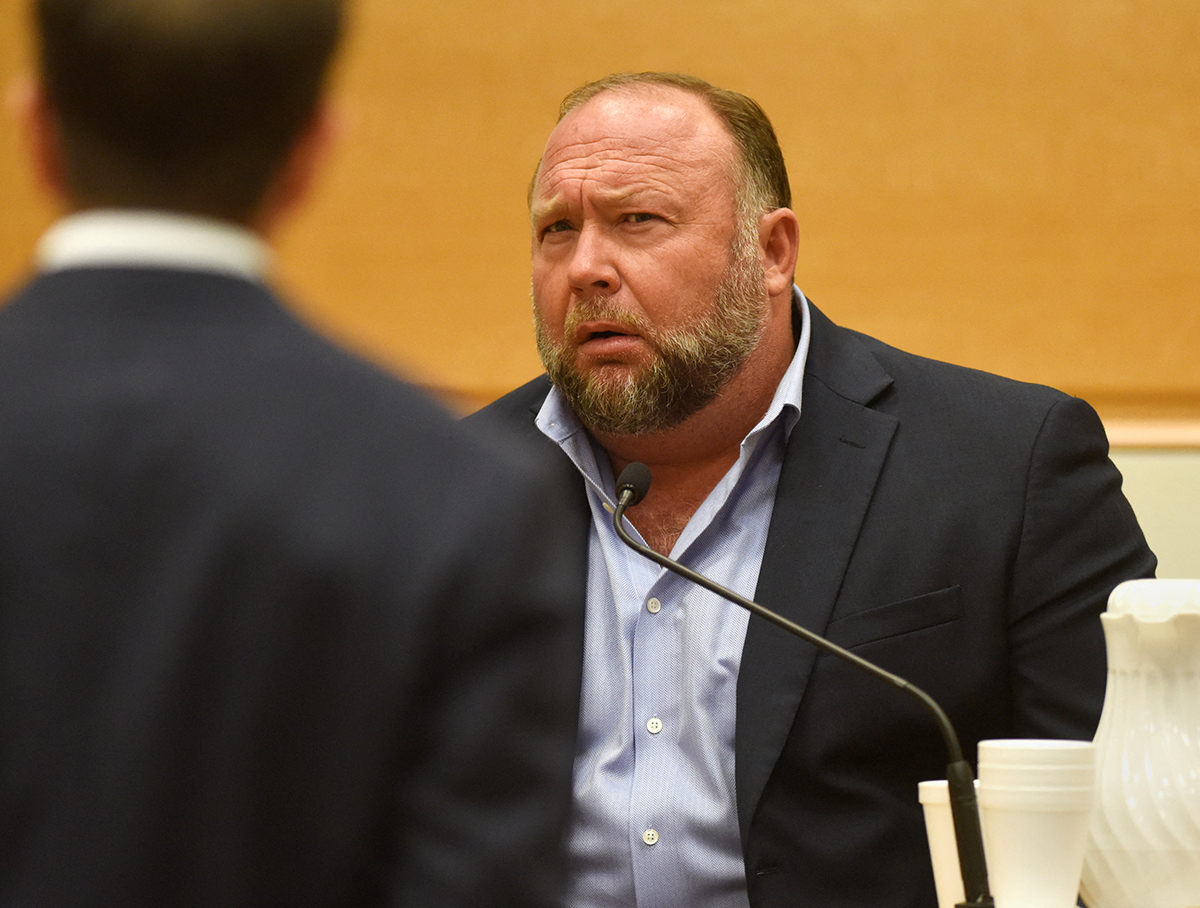The Supreme Court heard oral arguments March 27 in United States v. Hansen, a case that questions whether a clause of a federal statute which criminalizes the encouragement of illegal immigration to the United States violates the First Amendment.
The “encouragement clause,” 8 U.S.C. §1324(a)(1)(iv), states that any person who “encourages or induces an alien to come to, enter, or reside in the United States, knowing or in reckless disregard of the fact that such coming to, entry, or residence is or will be in violation of law.”
From October 2012 to January 2016, California resident Helaman Hansen encouraged noncitizens to immigrate to the United States for a substantial fee and the promise of citizenship. Hansen profited around $1 million from this “adult adoption” scheme, in which he convinced those seeking citizenship that an American citizen could adopt them. In 2017, he was sentenced to 20 years in prison on several charges, including two counts of “encouraging unlawful immigration.”
Hansen appealed his conviction and sentence to the U.S. Court of Appeals for the Ninth Circuit. In February 2022, the Ninth Circuit affirmed all of the charges except for the two counts of “encouraging unlawful immigration,” in which the panel held that the statute’s clause is overbroad and unconstitutional. The U.S. Department of Justice petitioned the Supreme Court for review, which was granted in December 2022.
According to the Justice Department’s petition, “Hansen defrauded almost 500 aliens, and, of course, no alien became a U.S. citizen.”
The question before the court is “Whether the federal criminal prohibition against encouraging or inducing unlawful immigration for commercial advantage or private financial gain, in violation of 8 U.S.C. 1324(a)(1)(A)(iv) and (B)(i), is facially unconstitutional on First Amendment overbreadth grounds.”
In its brief the Justice Department argued that “the terms ‘encourage’ and ‘induce’” in the statute “are familiar criminal-law terms of art,” meaning they are typically associated with criminal activity and therefore are not protected categories of speech because incitement to imminent lawless action is not protected under the First Amendment.
But attorneys representing Hansen argued that this provision is “facially overbroad because it prohibits a substantial amount of speech protected by the First Amendment,” according to the brief. “By prohibiting all speech ‘encourag[ing] or induc[ing]’ a noncitizen to remain in the country or enter in violation of immigration law, it sweeps in a wide range of speech plainly protected by the First Amendment.”
Hansen’s attorneys referenced the 1969 Supreme Court decision in Brandenburg v. Ohio, arguing that the “First Amendment protects speech advocating even criminal conduct so long as it is not ‘likely to incite or produce’ ‘imminent’ criminal conduct.”
Throughout the course of the arguments, the justices questioned what exactly it may mean to “encourage” or “induce” criminal activity.
Principal Deputy Solicitor General Brian Fletcher argued on behalf of the Biden administration, and claimed that “prohibitions on soliciting or facilitating both criminal and civil violations have long been common and have never been thought to raise a First Amendment problem because … the First Amendment does not protect speech that is intended to induce or commence specific illegal activities.”
Fletcher noted that while “it will sometimes be hard to draw the line between protected advocacy and unprotected solicitation,” that issue is not isolated to this specific statute, but is an issue that “can arise under any solicitation or aiding-and-abetting statute.”
Justice Elena Kagan questioned Fletcher on what type of speech would be considered “inducing” or “encouraging” under this statute.
Justice Kagan: “What happens to all the cases where it could be a lawyer, it could be a doctor, it could be a neighbor, it could be a friend, it could be a teacher, it could be anybody says to a noncitizen, I really think you should stay? What happens to that world of cases?”
Fletcher said the government’s view is that cases reflective of those examples would be “analyzed the same way that you’d analyze any other aiding-and-abetting question or solicitation question under any other statute.” Fletcher then provided more context, but Justice Kagan pushed for further clarification on the distinction between possible advocacy, or casual conversation, and the speech that would violate the statute.
Justice Kagan: “Do I understand you to be drawing a line between a friend who says, I know exactly what the law is on this and I really think you should stay, which would be in violation of the law, that’s on one side of the line, and saying that exact same thing and saying also, I’m going to provide you support when you stay? Is that the line you’re drawing?”
Fletcher said “not precisely … I just think it’s hard to say that a charity that provides assistance to people, including people who are in the country unlawfully, is meeting the requisites of aiding and abetting liability.”
But, Justice Ketanji Brown Jackson seemed unconvinced that this type of advocacy wouldn’t violate the statute.
Justice Jackson: “But I don’t know why you say that. I mean, if the civil violation or the criminal violation is to have the person stay here and remaining here is unlawful, why wouldn’t giving them food and shelter that facilitates their ability to stay here violate the statute?”
Chief Justice John Roberts questioned Fletcher on whether there had been any previous prosecutions under the statute that compare to Justice Kagan’s and Justice Jackson’s examples.
Fletcher: “No, absolutely not, Mr. Chief Justice. And, you know, likewise, you could imagine, I think, one of the things I said earlier is that we would take cases under this statute the same way you take cases under other aiding-and-abetting statutes. You know, you can imagine there are a lot of social services organizations that provide services and counseling to people who are engaged in unlawful activity, and I’m not aware of cases that suggest that the provision of those services to someone who happens to be engaged in unlawful activity aids and abets those activities.”
Justice Sonia Sotomayor: “We do know that the Customs Department made a list of all of the people, religious entities, the lawyers, and others who were providing services to immigrants at the border and was saying that they intended to rely on this statute to prosecute them. You’re saying to me it didn’t happen. Congress issued a subpoena to many of these organizations, did a lot of investigation as to what was said. So how do we tell all those people not to chill speech because the only thing being punished under this statute, unless you want me to add that it has to say that the statute requires something more than just words, we’re criminalizing words related to immigration … I know of no other statute where aiding-and-abetting punishment or solicitation punishment is greater than the punishment we’re giving the person who’s going to commit the crime. But that’s what we’re doing with this statute. It’s a first of a kind.”
Justice Sotomayor then asked Fletcher a hypothetical in which she described a grandson asking his grandmother to stay in the United States despite a lack of citizenship.
Justice Sotomayor: “Can you prosecute this? And, if not, why not? So what do you tell the grandmother?”
Fletcher: “I think not, Justice Sotomayor. I think it’s very hard to make out –“
Justice Sotomayor: “Don’t — stop qualifying with “think,” because the minute you start qualifying with “think,” then you’re rendering asunder the First Amendment.”
Fletcher: “Justice Sotomayor –“
Justice Sotomayor: “People have to know what they can talk about.”
After Fletcher’s time concluded, Hansen’s attorney Esha Bhandari, the deputy director of the American Civil Liberties Union’s Speech, Privacy and Technology Project, made her opening statements.
Bhandari: “This Court has consistently resisted prior invitations to expand categories of unprotected speech and should do the same here. Otherwise, Congress and the states will be free, without any First Amendment scrutiny, to criminalize speech soliciting violations of the vast range of administrative and regulatory laws that govern us today, from mask and vaccine mandates to parking ordinances.”
Justice Samuel Alito questioned an aspect of Bhandari’s opening remarks, in which she said that “even if you construe the statute as limited to solicitation or aiding and abetting, this Court should not create a new category of unprotected speech, namely criminal solicitation of civil law violations.” After Bhandari confirmed Justice Alito’s understanding of her argument, he raised a hypothetical on prostitution.
Justice Alito: “Not soliciting a prostitute but encouraging someone to engage in prostitution, that cannot be criminalized?”
Bhandari: “If prostitution is not a crime, then such speech is not categorically unprotected. It would just be subject to First Amendment scrutiny, which means that if the government had a compelling interest and narrowly tailored that law, they could do so.”
Justice Alito then raised another hypothetical, this time questioning if someone is encouraged to commit suicide if it’s also subjected to strict scrutiny. When Bhandari said it was, Justice Alito took it a step further.
Justice Alito: “What if the person who is encouraged to commit suicide is intellectually disabled, particularly vulnerable to that encouragement?”
Bhandari: “Again, I think if a state or Congress passed a law that was directed specifically at encouraging someone in that vulnerable state and narrowly tailored it, it very well might pass strict scrutiny, but –“
Justice Alito: “And why would that be, because that’s an important interest, protecting those people is an important interest?”
Bhandari: “That’s correct. I think the strict scrutiny analysis builds into it the interest that the government has in criminalizing speech.”
Justice Neil Gorsuch seemed reluctant to agree with Bhandari, noting Hansen’s criminal conduct and fraudulent scheme.
Justice Gorsuch: “It is a little awkward, tough, that this case comes up in a posture with Mr. Hansen, who I don’t think anybody could say he’s been chilled from speaking. I mean, he’s had no problem soliciting people here in this country and defrauding them to the tune of lots and lots of money. He has victimized these people, and it may be a poster child for a situation in which the underlying offense might be modest, but you might want to criminalize it because he’s taking advantage of very vulnerable people.”
Justice Gorsuch referred to other justices weighing in with hypothetical instances and stated, “It’s just a little awkward that we’re worried about chilling other people’s speech and it has nothing to do with the case before us.”
March 27, 2023 — Supreme Court Oral Arguments Transcript in United States v. Hansen
Feb. 10, 2022 — U.S. Court of Appeals for the Ninth Circuit Opinion
Dec. 18, 2017 — U.S. District Court for the Eastern District of California Judgment
Tags
